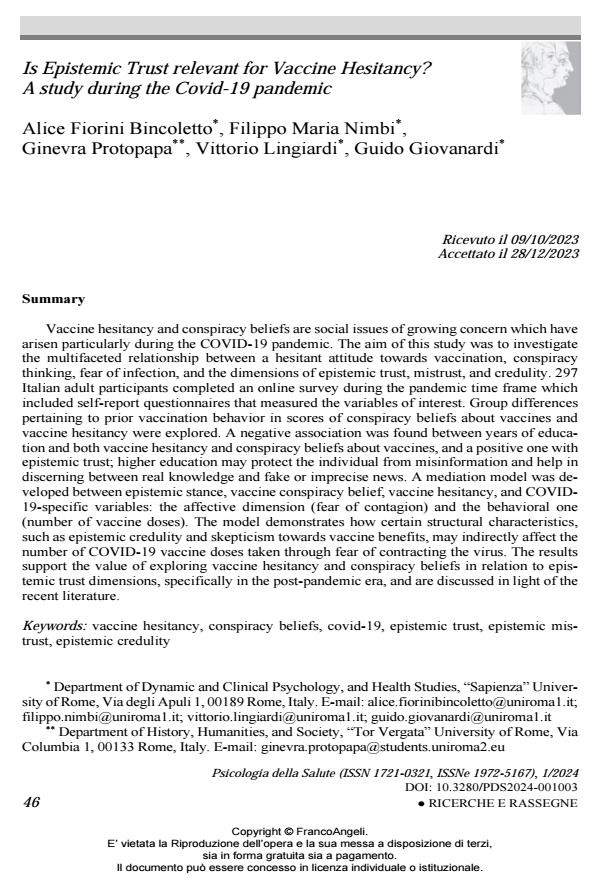Is Epistemic Trust relevant for Vaccine Hesitancy? A study during the Covid-19 pandemic
Journal title PSICOLOGIA DELLA SALUTE
Author/s Alice Fiorini Bincoletto, Filippo Maria Nimbi, Ginevra Protopapa, Vittorio Lingiardi, Guido Giovanardi
Publishing Year 2024 Issue 2024/1
Language English Pages 21 P. 46-66 File size 345 KB
DOI 10.3280/PDS2024-001003
DOI is like a bar code for intellectual property: to have more infomation
click here
Below, you can see the article first page
If you want to buy this article in PDF format, you can do it, following the instructions to buy download credits

FrancoAngeli is member of Publishers International Linking Association, Inc (PILA), a not-for-profit association which run the CrossRef service enabling links to and from online scholarly content.
Vaccine hesitancy and conspiracy beliefs are social issues of growing concern which have arisen particularly during the COVID-19 pandemic. The aim of this study was to investigate the multifaceted relationship between a hesitant attitude towards vaccination, conspiracy thinking, fear of infection, and the dimensions of epistemic trust, mistrust, and credulity. 297 Italian adult participants completed an online survey during the pan-demic time frame which included self-report questionnaires that measured the variables of interest. Group differences pertaining to prior vaccination behavior in scores of con-spiracy beliefs about vaccines and vaccine hesitancy were explored. A negative associa-tion was found between years of education and both vaccine hesitancy and conspiracy beliefs about vaccines, and a positive one with epistemic trust; higher education may protect the individual from misinformation and help in discerning between real knowledge and fake or imprecise news. A mediation model was developed between ep-istemic stance, vaccine conspiracy belief, vaccine hesitancy, and COVID-19-specific variables: the affective dimension (fear of contagion) and the behavioral one (number of vaccine doses). The model demonstrates how certain structural characteristics, such as epistemic credulity and skepticism towards vaccine benefits, may indirectly affect the number of COVID-19 vaccine doses taken through fear of contracting the virus. The re-sults support the value of exploring vaccine hesitancy and conspiracy beliefs in relation to epistemic trust dimensions, specifically in the post-pandemic era, and are discussed in light of the recent literature.
Keywords: vaccine hesitancy, conspiracy beliefs, covid-19, epistemic trust, epistemic mistrust, epistemic credulity
- No more than “half prevention”: A qualitative study on psychosocial determinants of Covid-19 vaccination acceptance Miriam Capasso, Maria Florencia González Leone, Marcella Bianchi, Federica Mari, Daniela Caso, in Acta Psychologica 104406/2024 pp.104406
DOI: 10.1016/j.actpsy.2024.104406 - Trust under development: The Italian validation of the Epistemic Trust, Mistrust, and Credulity Questionnaire (ETMCQ) for adolescents Alberto Milesi, Marianna Liotti, Francesca Locati, Pietro De Carli, Anna Maria Speranza, Chloe Campbell, Peter Fonagy, Vittorio Lingiardi, Laura Parolin, Stephan Doering, in PLOS ONE /2024 pp.e0307229
DOI: 10.1371/journal.pone.0307229
Alice Fiorini Bincoletto, Filippo Maria Nimbi, Ginevra Protopapa, Vittorio Lingiardi, Guido Giovanardi, Is Epistemic Trust relevant for Vaccine Hesitancy? A study during the Covid-19 pandemic in "PSICOLOGIA DELLA SALUTE" 1/2024, pp 46-66, DOI: 10.3280/PDS2024-001003